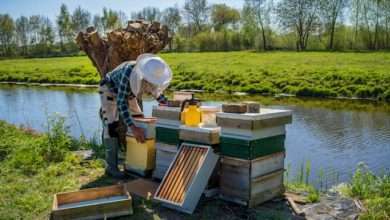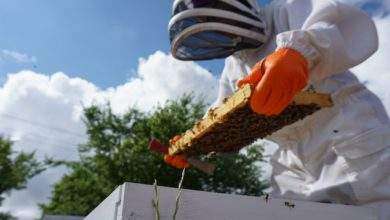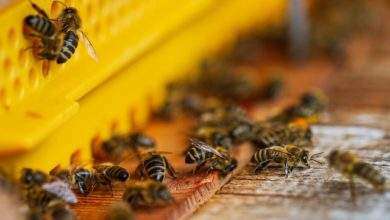Afraid of Getting Stung?
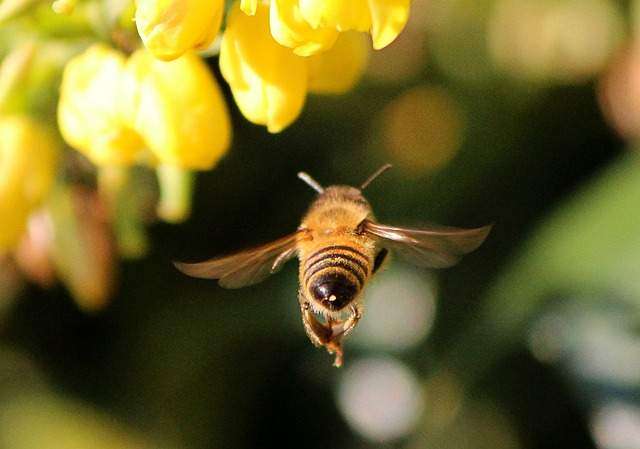
Feeling Nervous About Being Stung?
Bees are some of the coolest and most beautiful tiny critters in the insect world, and they serve a critical role in preserving Earth’s biodiversity and in the very survival of humans.
They pollinate not just plants that are important to the ecosystem and provide food for a wide variety of insects, animals, and birds but also harvests of colorful fruits and vegetables that humans rely on and enjoy.
In the United States, honeybees predominate. Many of the flowers and plants you see in grocery stores would not survive without them. The reason for this is that when foraging, bees distribute pollen from flower to flower, allowing plants to reproduce.
Bees are always foraging for nectar and pollen to take back to their colonies and feed their developing offspring. They feed on nectar, a pleasant liquid secreted by some plants, and transport pollen back to the hive. That’s why if you see a bee swarming a Coke can or trash can, you know why. Sugar’s enticing aroma draws them in.
Keep in mind that not all bees are equipped to deliver a painful sting. Large, solitary bees called “drones” may sometimes visit your garden. They may easily dwarf you in size.
Many individuals are afraid of bees despite the fact that they play an important part in the environment and provide a valuable service to humans by pollinating crops. This may be due to unpleasant personal experiences with stings or to exaggerated or unfounded claims about bees’ viciousness. This misconception often centers on the fact that bees are equated with their more aggressive wasp relatives, despite the fact that wasps play an equally crucial role in pollination.
Bees are docile insects whose main motivation is to visit as many flowers as possible in quest of pollen and nectar to feed themselves and their growing young. In reality, less than half of all bees can sting, and those that do only do so as a last option.
What are the odds of being stung by a bee?
Unless you intentionally disturb a beehive or accidently squash or tread on a bee, you probably won’t be stung. As a bee buzzes about your head, it can be curious about your perfume or aftershave, or it might have been drawn to the color of your shirt and mistaken you for a flower.
Social bees, such as honey bees and bumble bees, have stingers to defend their colonies and nests. Only the females of honey bees and bumble bees are able to sting; therefore, if you don’t want to be stung, stay at least 10 to 20 feet away from their nests. Unless you physically touch bees and they feel intimidated or trapped in clothes, the odds of being stung if you are viewing these bees on a patch of flowers and not near their nest are minimal.
In what ways can I overcome my fear of bees?
Like many other phobias, specialists often advocate exposure treatment to help patients address their concerns. Taking a stroll in the park when bees are buzzing about, letting a bee land on your hand without swatting it away, chatting with a neighborhood beekeeper, or even housing a hive in your garden are all examples of this.
Because they don’t have nests to defend or colonies to protect, our natural solitary bees are even more docile in temperament. Bees may be safely approached, even within a few inches of them, while they are busy visiting flowers and feasting on pollen and nectar.
Symptoms of a Bee Sting
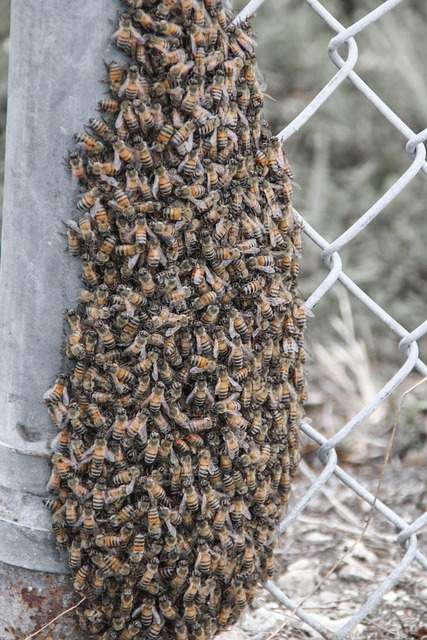
Some of the most typical reactions to bee stings include:
- Pain at the point of the sting is immediate and intense.
- A crimson welt where they were stung.
- Swelling near the site of the sting might be seen.
Avoid getting too close to a colony of social bees like honey bees or bumble bees, and keep your hands off of them if you’re viewing them as they flit from blossom to flower. Likewise, be careful where you walk in the wild; low-lying plants may harbor bees, and you don’t want stung.
I’m afraid about getting stung; what can I do?
You should try to see things from a different perspective. There are many good reasons to avoid bees, but we should remember how crucial they are in our lives.
- Bee prepared.
- Avoid disturbing bees.
- Try not to go to extremes to prevent being stung by bees.
- Try to chill out
- Make sure you take care of your health.
- Keep your EpiPen handy.
Many Advantages of Being Stung by a Bee
There’s some evidence that a bee sting might have health benefits.
Bee venom is a popular alternative medicine used to treat a wide range of conditions.
Some who advocate for it say it can alleviate inflammation and cure chronic conditions.
Apitherapy is a kind of alternative medicine that makes use of bee products, such as bee venom, to alleviate and prevent a wide range of health problems.
- Efficacy against inflammation
Bee venom’s potent anti-inflammatory properties are well-documented. Melittin, the primary component, and many of its other constituents have been found to have anti-inflammatory effects.
- Potential symptomatic relief for arthritis
In particular, patients suffering from rheumatoid arthritis (RA), a severe inflammatory disorder that affects the joints, may benefit from bee venom’s anti-inflammatory benefits.
- Possible skin health benefits
Bee venom has recently been used into several beauty products, including serums and moisturizers. Possible benefits to skin health include decreased inflammation, antimicrobial properties, and wrinkle smoothing from the use of this substance.
- Immune system wellness
It has been shown that exposure to bee venom is beneficial to immune cells that mediate inflammatory and allergic reactions.
Since they are such efficient pollinators, bees are visitors that are always appreciated in agricultural and garden settings. Please spend some time in your yard or on vacation without worrying about getting stung, and while you are there, marvel at the great diversity of these small critters as they feast on the sweet nectar of the flowers they visit.
If you were stung by a bee, what should you do?
- Keep your cool. Unlike bees, which typically only sting once, wasps and hornets may strike several times.
- Remove stinger, if present.
- Wash the affected area with soap and water.
- Reduce swelling with the use of a cold compress.
- Try some over-the-counter pain relievers.
FAQ

Do bees sting if they sense fear?
- Instinctively swatting a bee when you see it can be your first reaction if you have a phobia of them. Yet, this will provoke the bees’ defensive reaction. Bees are very sensitive to movement and are more likely to sting humans who are jerking their bodies about. Because of this, it primes them to sting.
What is the fear of getting stung by a bee?
- Apiophobia, also known as melissophobia, is a fear of bees. It’s a kind of “specific phobia,” in which the sufferer experiences extreme anxiety about something that poses little to no real threat. Some people get anxiety attacks after being stung by a bee.
Is there a way to avoid being stung by bees?
- Throw away all food and drink. The presence of food is the primary attractant that draws bees to your yard.
- Do not give off a floral aroma.
- Try on a new ensemble.
- There’s no need to freak out when you see a bee or a wasp.
- In case of an emergency, always have access to an epinephrine auto-injector.
What makes a bee sting different from a wasp sting?
- Stings from bees and wasps are quite similar. Bees’ characteristic barbed stingers are a telling indicator of their presence. Yet, wasps have a smooth stinger that they may reuse.
How dangerous is a sting from a bee?
- Stings may cause significant disease and even death in those allergic to bees or stung several times. According to the Centers for Disease Control and Prevention, anaphylactic shock from stings kills up to 100 individuals annually in the United States.
